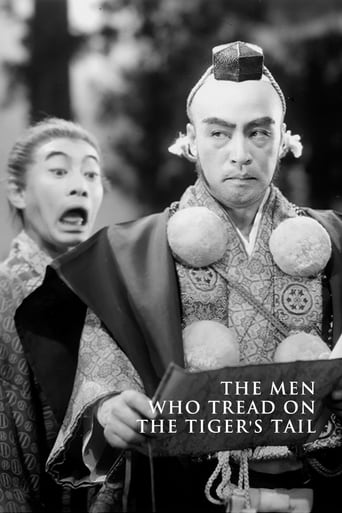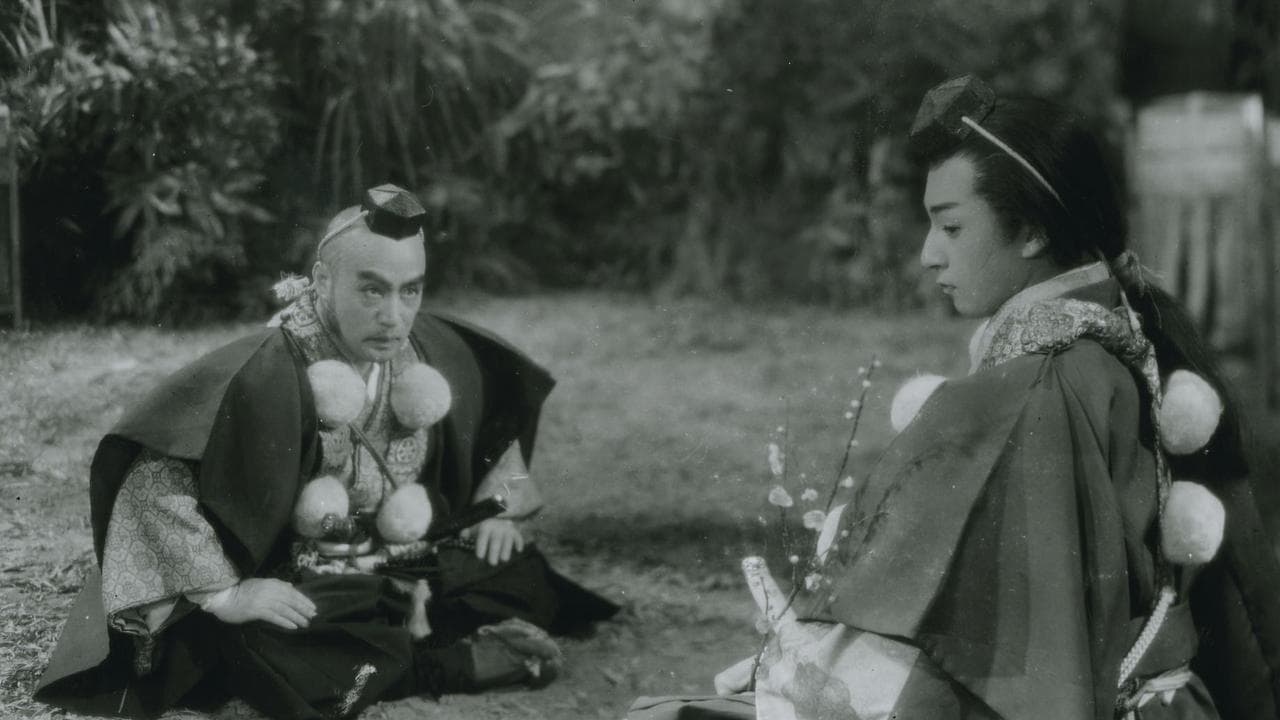William Samuel
The Men Who Tread on the Tiger's Tail, adapted from the kabuki play Kanjinchō, tells the tale of Minamoto no Yoshitsune, a feudal lord who must flee his lands with his most loyal retainers disguised as a party of itinerant monks. It is a simple film, with a straightforward plot, only a handful of characters, and a feel more akin to a filmed stage play than major studio production. Its running time, including credits, comes in at just under an hour.Yet it has an endearing minimalist charm to it that. The story may be simple, but it is nonetheless compelling, with more than hint of danger and important lessons about friendship and honor. It is well acted, especially the part in which one of the retinue must bluff his way past the guards by reciting a history of their order from memory. The comic relief, provided by the group's porter, is also quite good, and the villain is convincingly dislikable.I admit that this is not a particularly exciting film, nor a visually impressive one. The handful of sets are sparse, and only occasionally is there anything in the way of action. I also confess that western viewers unfamiliar with the art of kabuki (such as myself) will likely miss a great deal of subtext. It is by no means the kind of masterpiece that the director, Kurosawa, would later go on to film, but it is engaging in its own way. The average American audience may not find much here, but those familiar with Japanese culture and arts should find much to enjoy.
Claudio Carvalho
In 1185, the Seike family fights against the Minamoto family. After a bloody naval battle in the Pacific Ocean, Yoshitsune Minamoto (Shubo Nishina) defeats the enemy and the survivals commit suicide. When the triumphant Yoshitsune arrives in Kyoto, his brother, the Shogun Ioromoto, is lured and orders his men to arrest Yoshitsune. However, Yoshitsune escapes with six loyal samurais led by Benkei (Denjirô Ôkôchi) and they head to the country of his only friend Idehira Fukiwara.Nearby the border, after crossing the forest disguised as monks, their smiley conveyor Suruga (Yoshio Kosugi) discloses that they are Yoshitsune and the six samurais and advises that the fearful Kagiwara and his soldiers are waiting for them in the border to arrest them. Yoshitsune disguises as a carrier and Benkei has to convince Kagiwara that they are six monks traveling to collect donation to build a large temple in Kyoto."Tora no o wo Fumu Otokotachi" is the third feature of Master Akira Kurosawa that shows his talent even with very limited budget. The acting is superb and Denjirô Ôkôchi performs a very wise samurai. Yoshio Kosugi is annoying and funny at the same time, with his chuckles. The conclusion is a little disappointing and gives the sensation that the story will be continued. The subtitles in the Brazilian DVD from Continental Distributor have synchronicity problems many times, and I had to use the rewind to read them. My vote is seven.Title (Brazil): "Os Homens que Pisaram na Cauda do Tigre" ("The Men that Stepped on the Tail of the Tiger")
cheese_cake
The movie is seemingly based on an event from Japan's past, but it is really Kurosawa's allegory on Japan's condition at the end of World War Two. A prince, estranged from his brother, and six of his loyal retainers wander through the forest. They all look disheveled and hard up. They must cross a barrier manned by officials who are not exactly friendly to them, before they can move on to improving their life. The prince is disguised as a lowly porter and we rarely see his face. his retainers are warriors but are now forced to don monk's robes and indeed in passing through the barrier manned by the unfriendly forces (read American's) the lead monk must read a treatise in which peace is extolled as the reason for their existence. basically, the monks are Japanese elite, the porter is the Japanese public, the prince is the emperor, the barrier officials are the Americans, whose leader is wise and although he knows the truth allows the monks to live. They are many truths within truths here. Indeed, in the end the adviser to the emperor says, "we must move on (read from the feudal system) if we are to survive". a very fine movie, short yet poignant. one can easily see even in this early feature of his that Kurosawa is a master at symbolic imagery. By the way this movie was made in 1945, but not released in Japan until 1952. After watching it, I can see why it was delayed. It would have been extremely painful as a Japanese citizen to watch this in 1945, with their country in shambles around them. highly recommended.
Michael_Cronin
Very well done, but "The Men Who Step On The Tiger's Tale" feels like the first act of a larger film, not a complete film in itself.It follows a party of samurai escorting a fugitive prince through enemy territory, accompanied by a clueless servant (echoing Kurosawa's later masterpiece, "The Hidden Fortress"). They come to a border crossing, are interrogated by the magistrate, convince him that they are actually a party of monks, & are allowed to proceed. Shortly after, a group of soldiers catch up to them & offer them a drink & apologies from the magistrate. They drink, get quite drunk, then the next thing we see is the servant waking up, deserted by both groups.The end.I had to check my copy of the film, log on here to check the running time & read several reviews to make sure that there wasn't some kind of mistake. No mistake, that's all there is. Were the samurai taken into custody while they were drunk? Were they spirits? Was the servant hallucinating or dreaming? I'm sure there's a reason for the film ending so abruptly, but it was ultimately a very unsatisfying experience. At the point it ended, I was ready for another encounter with danger, then perhaps another, followed by the party's escape, or capture & subsequent death. But no, it's the end.Recommended for Kurosawa fans & those interested in Kabuki theatre only.


 AD
AD


